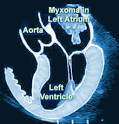
Diagnosed with Cancer? Your two greatest challenges are understanding cancer and understanding possible side effects from chemo and radiation. Knowledge is Power!
Learn about conventional, complementary, and integrative therapies.
Dealing with treatment side effects? Learn about evidence-based therapies to alleviate your symptoms.
Click the orange button to the right to learn more.
- You are here:
- Home »
- Blog »
- side effects ID and prevention »
- Late Effect- Cardiomyopathy from Chemotherapy
Late Effect- Cardiomyopathy from Chemotherapy

“researchers compared four chemotherapy drugs with development of cardiomyopathy (abnormal heart muscle with impaired function) years after treatment…”
According to the study linked and excerpted below, Dr. Gail Tomlinson believes that the increase in cancer survivors justifies the use of chemotherapy regimens that cause a late effect called chemotherapy-induced cardiomyopathy. The end justifies the means. I disagree with Dr. Gail Tomlinson, vehemently.
I underwent induction, consolidation and an ASCT for multiple myeloma, all in 1995. Adriamycin (doxorubicin) as one of my induction chemotherapies. I was an AYA cancer patient, not a pediatric patient. I think the issue is surviving for years, perhaps decades after doxorubicin treatment. I was diagnosed with chemotherapy-induced cardiomyopathy in January of 2019, just about 23 years after the administration after several cardiotoxic chemotherapy regimens.
I disagree with Dr. Tomlinson for the following reasons:
- Cardiotoxic chemotherapy can cause not just heart damage but a host of side effects including cardiomyopathy, hypertension, fatigue, chronic cough, chronic atrial fibrillation, others…
- Cardiotoxic chemotherapy may or may not “cure” the patient. My chemo didn’t cure me. A different therapy put me into complete remission yet I still developed chemo-induced cardiomyopathy…
- Cardiotoxic chemotherapy increases the risk of a therapy-induced secondary cancer...
I always thought that medical students took an oath when they became physicians to “first, do no harm.” Dr. Tomlinson must have misunderstood the meaning of the Hippocratic Oath. The idea that my cardiotoxic chemotherapy will kill me and not my cancer is …difficult to handle.
Though the research is in-vitro and in-vivo, there are therapies shown to reduce your risk of chemo-induced cardiomyopathy. If you would like to learn more, scroll down the page, post a question or comment and I will reply to you ASAP.
Thank you,
David Emerson
- Cancer Survivor
- Cancer Coach
- Director PeopleBeatingCancer
Recommended Reading:
- Can Pediatric/AYA Cancer Late-Stage Side-Effects be prevented?
- AYA, Childhood Cancer Survivors’ Future Risk of Heart Disease
- Risk of Therapy-Related Second Cancer “Exponentially Higher”
Do all chemotherapies have equal long-term heart risk?
“In long-term survivors of childhood cancer, cardiovascular disease is a leading cause of early death from non-cancer causes. In a new study, published Jan. 31 in JAMA Oncology, researchers compared four chemotherapy drugs with development of cardiomyopathy (abnormal heart muscle with impaired function) years after treatment…
“Exposure to anthracycline chemotherapies, such as doxorubicin, has long been associated with an increased risk of cardiovascular disease in long-term childhood cancer survivors…” “Previously, it was assumed that exposure to any member of the anthracycline class carried the same risk of late cardiovascular complications. By studying the outcomes of over 28,000 long-term survivors in the U.S. and Europe, this research indicates that exposure to different anthracyclines results in variable long-term cardiovascular risk. In the future, it will be important to take these differences into account when screening long-term survivors for cardiovascular complications and in the development of modern treatment regimens…”
The drug daunorubicin was associated with decreased cardiomyopathy risk when compared to doxorubicin, the study showed. Mitoxantrone, another chemotherapy, appeared to have greater long-term cardiomyopathy risk than was previously estimated…
“The past several decades have been focused on devising combinations of drugs that work best for curing patients,” said Gail Tomlinson, M.D., Ph.D., professor of pediatrics, division director of pediatric hematology-oncology… “This has been a highly successful process with a substantial increase in survival for most cancer types. Now with so many survivors alive many years from their original cancer, it is imperative to fine-tune protocols based on the goal of minimizing late effects.”


